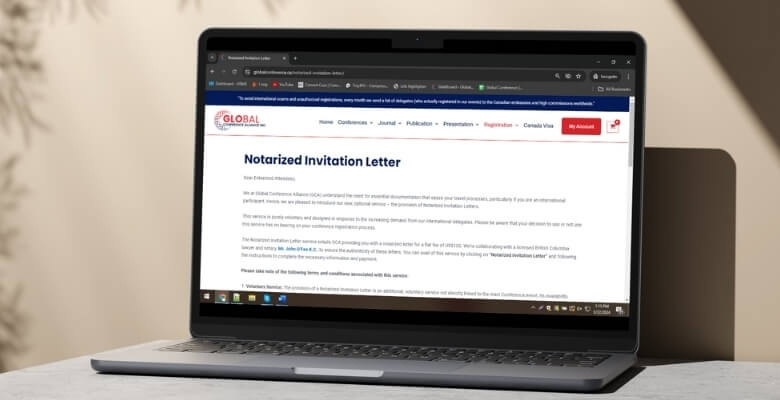Visiting Turkey is always exciting, and every traveler must carry the right documents before entry. A valid passport, visa, and sometimes extra papers are needed for approval. Among these, the notarized invitation letter creates the most confusion, leaving many travelers asking: Do I need a notarized invitation letter to visit Turkey.
A notarized invitation letter is not required for everyone. Tourists visiting for leisure usually only need a valid passport, and in some cases an e-Visa. For business meetings, conferences, family visits, or academic stays, consulates often request a notarized letter from your host in Turkey to support the visa application.
Are you curious about when exactly this letter is needed and how it works? Or do you want to know in which cases you can skip it? Keep reading, because this article explains everything you should know about notarized invitation letters for Turkey in simple and complete detail.
Do I Need a Notarized Invitation Letter to Visit Turkey?
Traveling to Turkey is exciting and comes with some rules you should know. One of the most asked questions is about the notarized invitation letter. Many travelers get confused about when this paper is needed. To clear things up, let’s look below to know when you need a notarized invitation letter and when you don’t.

Tourism Visits
If you are traveling just to see the sights, you usually do not need a notarized invitation letter. Most tourists can enter Turkey with a valid passport and, in some cases, an e-Visa. Proof of hotel booking and return tickets is often enough. Only certain nationalities might be asked for extra papers, so always check your consulate’s website.
Business Trips
For business visits, a notarized invitation letter is often requested. This letter is usually prepared by the company you will visit in Turkey. It shows that you have a real reason to travel and attend meetings. Without it, your visa process for business may be delayed or even refused.
Conferences and Events
If you are attending a conference in Turkey, you may need a notarized invitation letter. Organizers usually issue this letter with event details and your role. Once notarized in Turkey, it supports your visa application. Having it ready shows the consulate that your trip is professional and official.
Family or Friends
Visiting family or friends sometimes requires a notarized letter. Your host in Turkey can prepare this document, including their details and your stay plan. This confirms that you are invited and where you will stay. It is especially important for longer visits.
Special Cases
Extended stays, academic visits, or cultural programs may also require a notarized letter. For example, universities often prepare these for exchange students or guest lecturers. The letter explains the purpose, dates, and host information. Always confirm with the Turkish consulate to avoid missing documents.
Difference Between a Regular and a Notarized Invitation Letter
When it comes to visas, not all invitation letters carry the same weight. A regular invitation letter is simple and informal, while a notarized one is official and legally verified. Knowing the difference helps you prepare the right document for your visit.
| Aspect | Regular Invitation Letter | Notarized Invitation Letter |
| Formality | Simple written statement from the host. | Official document verified by a Turkish notary. |
| Legal Weight | Has limited value for visa officers. | Considered legally binding and strongly supports a visa. |
| Usage | Often enough for short family or friend visits. | Required for business, conferences, or extended stays. |
| Host Details | May include the host’s name, address, and phone. | Must include the host’s full details, TR ID number, and signature. |
| Company Proof | Usually, no company papers are attached. | Company hosts must add tax registration certificate and an official stamp. |
| Verification | No legal verification, based on trust. | Verified by a notary, proving authenticity and accuracy. |
| Acceptance | May or may not be accepted depending on the consulate. | Widely accepted by consulates as valid supporting document. |
| Cost & Effort | Free, quick to write. | Involves notary fees and time for processing in Turkey. |
How to Check If Your Visa Office Requires a Notarized Invitation Letter for Turkey?
Travel rules can feel confusing because not every consulate works the same way. Some may ask for a notarized invitation letter, while others may not. To make things clear and avoid mistakes, it is important to confirm the rule before you apply. Below you will find simple ways to check if your visa office requires it.
Official Website
Start by visiting the official website of the Turkish Ministry of Foreign Affairs or the e-Visa portal. These sites often explain general rules for tourists and business travelers. However, remember that general rules can differ from consulate-specific rules. Always read carefully and check updates.
Consulate Checklist
Every Turkish consulate usually publishes its own visa checklist. This document shows exactly what papers are needed for each visa type. If a notarized invitation letter is required, it will be listed here. Download the checklist and follow it step by step.
Contact by Email
If the checklist seems unclear, you can email your consulate directly. Write a short and polite message, giving your travel purpose and asking if a notarized invitation letter is required. Most consulates reply within a few working days. Keeping their answer as proof can help if questions arise later.
Call the Office
For urgent cases, a phone call is the fastest option. Ask for the visa section and explain your travel purpose. The staff can confirm if you need a notarized invitation letter. Always note down the date, time, and the name of the person you spoke to.
Compare Experiences
You can also check online forums or talk with friends who recently applied at the same office. Their experiences can give hints about what documents were asked for. Still, do not depend only on these stories. Use them only to prepare better before contacting the consulate.
Plan Ahead
Rules may change without much notice, and offices may add new requirements. This is why it is important to confirm early and gather your papers in time. Preparing a notarized letter, if needed, can take days, so plan to avoid last-minute stress.
Who Can Send an Invitation Letter From Turkey?
Planning a visit to Turkey involves many details, and one important factor is who can actually send you an invitation letter. Not everyone qualifies, so it’s essential to know the right person or group. To understand this better, let’s look at the main options below.
Family Members
Close family members living in Turkey can send an invitation letter. They need to include their Turkish ID number, address, and relationship with you. This type of letter is often needed for longer family visits. Consulates trust such letters when supported by clear family details. Below is an example invitation letter that your family member could send you.
Friends
Friends who live in Turkey may also send an invitation letter. They must include their personal information and explain their friendship. The letter should also mention where you will stay and for how long. It adds weight if the friendship is well explained. Here is a sample invitation letter you can get from your friends.
Turkish Citizens
Turkish citizens can issue invitation letters whether they are family, friends, or business contacts. Their citizenship details make the letter strong in the eyes of the consulate. It is important that they provide full identity details and correct contact information. The more complete the letter, the better your application looks. Here is an example of an invitation letter that Turkish citizens may send you.
Business Partners
Companies or business partners in Turkey often prepare notarized invitation letters. These usually include company tax numbers and official stamps. Such letters are important for business visas and trade visits. They show that your trip has a genuine and official purpose. This is a sample invitation letter that you might receive from business partners.
Conference Organizers
Organizers of conferences or large events in Turkey can provide invitation letters. These letters include event details, dates, and your role as participant or speaker. A notarized copy is common for official events, and following the conference organizer’s invitation requirements ensures your letter is accepted. Having this letter helps your visa process move faster and smoothly. The conference organizers may send you an invitation letter like this one.
Academic Institutions
Universities and research centers often send invitation letters for exchange, study, or research visits. They clearly explain the purpose, dates, and nature of your academic work. These letters are common for visiting professors or students. A notarized version gives extra support to the visa application. Here is a sample invitation letter you can get from Academic Institutions.
What Should Be Included in the Invitation Letter?
An invitation letter becomes useful only when it carries all the required details. Missing even one important point can cause trouble in the visa process. To keep your application smooth, here are the key details explained below:
- Full Identity
- TR ID Number
- Address
- Contact Information
- Invitee Details
- Dates and Purpose
- Company Details
Full Identity
The letter must clearly show the host’s full name as written in official documents. Nicknames or shortened names can create confusion. Adding the invitee’s full name and passport details is also important. This shows the consulate that both parties are identified correctly.
TR ID Number
For Turkish citizens, the national identification number is a must. This number proves the legal identity of the person inviting you. Without it, the letter may not be accepted. Always double-check that it is written correctly.
Address
Including the host’s full residential or company address in the letter is essential. It shows where the guest will stay or visit during their time in Turkey. A complete address with street, city, and postal code adds clarity and helps the consulate understand the travel plan better.
Contact Information
The host must share phone numbers and email addresses in the letter. This makes it easy for the consulate to verify details if needed. Clear contact information builds trust in the application. The invitee’s contact details may also be added for extra clarity.
Invitee Details
Listing the invitee’s name, passport number, and date of birth is essential. In cases of multiple visitors, each person’s details should be mentioned clearly. Providing complete information helps avoid confusion and makes the letter appear official and reliable.
Dates and Purpose
Exact dates of arrival and departure are very important. The letter must also explain the purpose of the visit, such as a family visit, business, conference, or study. Both details give the consulate a clear idea of the plan. Without them, the letter looks incomplete.
Company Details
If the host is a business or company, extra details are required. The company must include its tax registration number and official stamp. This proves that the business is real and legally registered. Adding these details strengthens the application for business or trade visas.
Do Conference Organizers Ask for Anything Extra for an Invitation Letter?
Conference organizers usually prepare invitation letters with basic details about the event, participant, and travel dates. Sometimes, they request additional supporting documents from attendees. These extra requests can include proof of registration, payment receipts, or a copy of the participant’s passport identification page. By asking for such documents, organizers make sure the turkey invitation letter holds stronger value during the visa application stage.
Some events, especially large international ones, may also require a short statement of purpose from the attendee. This helps them confirm that the applicant is genuinely attending for professional reasons and not for personal visits. For conference visas, consulates sometimes demand that the host’s invitation letter be notarized in Turkey for official recognition. Understanding these steps early can prevent last-minute issues with your travel application process.
It is always smart to confirm what is needed directly with the organizers before applying for your visa. They may provide clear instructions that include the steps to get conference invitation letters from Turkey without confusion or unnecessary delays. By following the checklist given by organizers, you can gather all supporting documents in time. This makes your invitation letter stronger and improves the chance of smooth visa approval.
How to Get a Notarized Invitation Letter From Turkey?
Getting a notarized invitation letter may sound difficult, but it is simpler once you know the steps. The process starts with the host in Turkey and ends with you adding the document to your visa file. Let’s break it down step by step so you know exactly what to do.
Confirm the Need
Before starting, confirm if you really need a notarized letter. Not everyone requires it, as tourists usually travel without one. But for business, conferences, family visits, or academic stays, many consulates ask for it. Checking early saves you time and effort.
Contact the Host
Your host in Turkey plays the main role in preparing the letter. This can be a family member, a friend, a company, or an institution. They must include their full details, your details, and the purpose of your visit. A clear draft helps avoid corrections later.
Draft the Letter
The draft must cover all required details such as names, passport numbers, TR ID, address, dates, and purpose. For company hosts, tax registration details should also be added. The draft should look formal and error-free. Once prepared, it is ready for notarization.
Visit the Notary
The host must take the draft letter to a notary public in Turkey. The notary will check the details, stamp the document, and confirm it as official. This step makes the letter legally valid. Without notarization, the letter has no legal weight.
Send to Invitee
After notarization, the host must send the invitation letter to you. Some consulates ask for the original, while others may accept a scanned copy. It is important to check the rules of your specific consulate. Always keep the document safe until submission.
Add to Visa File
Once you have the letter, include it in your visa application file. Attach it along with your passport, form, insurance, and other documents. The notarized invitation letter strongly supports your application. It shows the consulate that your visit has a clear purpose.
How Should My Inviter Format the Invitation Letter So It is Easy for Officials to Read and Verify?
Formatting matters because it helps visa officers quickly find the details they need. A clean structure avoids confusion and delays. Small design choices like font, spacing, and alignment can make the letter look professional and official. Here are the key points your inviter should follow for a clear format:
- Readable Font: The inviter should use simple fonts like Arial or Times New Roman in size 11 or 12. This keeps the letter clear, easy to read, and professional in appearance.
- Proper Margins: All sides of the letter should have margins of around one inch. Equal spacing creates balance and ensures nothing looks crowded or confusing.
- Left Alignment: The text must be aligned to the left side of the page. Left alignment looks neat, keeps everything straight, and feels more official to reviewers.
- Clear Spacing: Each section should be separated by a blank line to make details stand out. Spacing improves readability and helps officers verify information quickly.
- Bullet Lists: When listing multiple details, use bullet points or numbers instead of long sentences. This makes it faster for officials to check facts.
- Paper Choice: If submitting a physical copy, always print on plain white A4 or letter-size paper. Clean paper looks official and prevents unnecessary distractions.
Tips to Avoid Visa Rejection for Turkey
Visa rejection can feel stressful, but many times it happens because of small mistakes or missing documents. Preparing carefully makes a big difference. To avoid problems with your Turkey visa, let’s look at the key points below.
Complete Documents
Always make sure every required document is included in your file. Missing one paper can delay or even stop your application. Checklists are given by each consulate, so follow them exactly. Double-check everything before submitting your documents.
Correct Information
All forms must be filled with true and accurate information. Even small mistakes like wrong dates or spelling can cause issues. Officials compare details on every document, so they must match. Honesty and accuracy are the safest path.
Valid Passport
Your passport should be valid for at least six months beyond your planned stay. Expired or soon-to-expire passports often cause rejections. Make sure it has enough blank pages for stamps. Renew early if your passport is close to expiry.
Travel Itinerary
Provide a clear travel plan with flight bookings and accommodation details. Showing your return ticket proves you will leave after your visit. Hotel reservations or a host’s invitation letter support your application. A simple itinerary makes your travel purpose believable.
Financial Proof
Consulates want to see that you can afford your stay in Turkey. Bank statements or sponsor letters are often required. This proof should cover travel, accommodation, and daily needs. Without it, applications are usually considered weak.
Health Insurance
Valid travel health insurance covering your full stay is a must. It shows you can handle unexpected medical expenses. Most consulates reject applications missing this document. Buy insurance early and keep a printed copy for your file.
Invitation Letter
If you are visiting for business, family, or conferences, a notarized invitation letter is often required. This document confirms your visit’s purpose. Make sure it includes all important details like names, ID, and dates. A strong letter can support your application.
Apply Early
Submitting your visa application early gives you more time to fix mistakes if something is missing. Consulates can take weeks to process applications, so waiting until the last moment is risky. Early submission also helps you handle unexpected delays like public holidays or system issues. A head start means less stress and more chances for approval.
Commonly Asked Questions
Many travelers still feel unsure about notarized invitation letters, even after learning the basics. To clear up confusion, here are some of the most common questions people ask about the topic, with simple and direct answers.
How to Get Invitation Letter From Turkey?
To get an invitation letter from Turkey, you first need to register for the conference or event you want to attend. After registration, contact the organizers and provide them with documents like your passport copy, payment receipt, or registration proof. Once verified, they will issue your official Turkey invitation letter, which you can use for your visa application.
Can I Submit a Scanned Copy of the Invitation Letter?
Yes, some Turkish consulates accept scanned copies of notarized invitation letters if the original cannot arrive in time. However, many still prefer or request the original version for security reasons. It’s best to confirm directly with your local consulate to avoid delays.
What Happens If My Invitation Letter Has Errors?
If the invitation letter has incorrect details such as spelling mistakes, wrong dates, or missing numbers, the consulate may reject it. Errors can delay or harm your visa application. Always double-check the document and request corrections from your host before submission.
Do Children Also Need an Invitation Letter?
Children traveling with parents for tourism usually don’t need an invitation letter. But if the visit involves long stays, family reunions, or study purposes, a letter might be required. Always check consulate rules for minors before applying for their visas.
Can One Letter Cover Multiple Visitors?
Yes, one notarized invitation letter can include details of more than one visitor if the host lists all names clearly. Each invitee’s passport information and travel dates should be included. This saves time and avoids preparing separate letters for every traveler.
Is the Notarized Invitation Letter Enough to Guarantee a Visa?
No, a notarized invitation letter by itself does not ensure that a visa will be granted. It only supports the application by proving the visit’s purpose. Consulates still review financial proof, health insurance, and other documents. All requirements together decide whether your visa is approved or rejected.
How Long Is a Notarized Invitation Letter Valid?
A notarized invitation letter is usually valid for the specific dates mentioned in it. Consulates expect the applicant to apply within that timeframe. Submitting a letter that is outdated or expired may cause the visa application to be rejected immediately.
Do Digital Invitations from Events Count as Official?
Digital invitations sent by email for conferences or business events are not the same as notarized letters. They can prove registration, but usually lack legal weight. To meet consulate requirements, applicants still need a notarized invitation letter from the event organizers.
What Are the Requirements for Turkey Visa?
To apply for a Turkey visa, you need a valid passport, a completed visa application form, and a recent passport-sized photo. You also need to provide proof of travel plans, like flight and hotel bookings, along with financial documents to show you can afford your stay. In some cases, you may also need an invitation letter, travel insurance, and other supporting papers, depending on your visa type.
Where Should I Confirm the Exact Requirements for My Invitation Letter?
The best step is to contact the conference organizers directly. They usually provide clear instructions about the invitation letter process. If you are applying from Tanzania, you should also confirm the visa requirements directly with the Turkey embassy in Tanzania, since they may have specific rules about notarization or supporting documents.
Conclusion
Traveling to Turkey brings excitement, but it also comes with steps you can’t skip. One of the biggest questions many people ask is whether a notarized invitation letter is needed. The answer depends on your purpose of visit and who is inviting you.
If your visit is for tourism, you probably don’t need one. But for business trips, academic stays, or conferences, a notarized letter adds strong support to your visa file. It shows that your visit is real and planned properly.
So, if you’ve been wondering do I need a notarized invitation letter to visit Turkey, now you know when it’s necessary and when it’s not. Always double-check with the consulate to be sure and get your documents ready early. A little preparation goes a long way for a smooth visa process.








